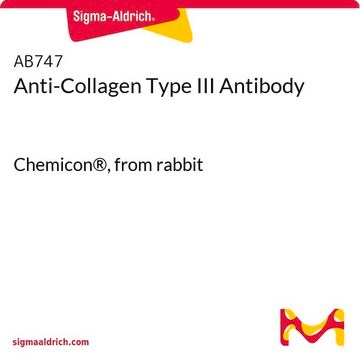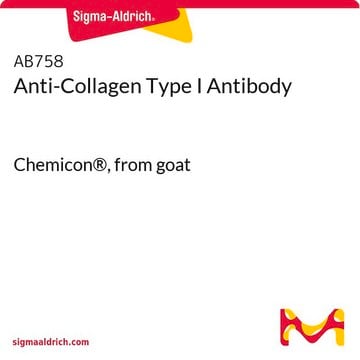일반 설명
Collagen is a fibrous protein present in the extracellular framework of all vertebrates. Collagen type III is a 300 kD molecule that belongs to fibrillar collagens family found mainly in skin, blood vessels, liver, placenta, tongue and thymus. This collagen is directly or indirectly involved in several genetic diseases like Ehlers-Danlos type IV disease. Monoclonal anti-collagen type III antibody can be used to determine the interstitial collagen I and III content in total protein homogenates. It is also used to study the immunolocalization of collagen type III in normal and neoplastic tissue. Mouse monoclonal anti-collagen type III antibody reacts specifically with native and denatured collagen type III but not with collagen types I, II, IV, V, VI, and X.
Collagen is a fibrous protein present in the extracellular framework of all vertebrates. Collagen type III is a 300 kD molecule that belongs to fibrillar collagens family found mainly in skin, blood vessels, liver, placenta, tongue and thymus. This collagen is directly or indirectly involved in several genetic diseases like Ehlers-Danlos type IV disease. Mouse monoclonal anti-collagen type III antibody reacts specifically with native and denatured collagen type III but not with collagen types I, II, IV, V, VI, and X. This product has also shown reactivity for rat and human collagen type III.
Monoclonal Anti-Collagen Type III (mouse IgG1 isotype) is derived from the FH-7A hybridoma produced by the fusion of mouse myeloma cells and splenocytes from BALB/c mice immunized with human collagen type III.
특이성
Monoclonal Anti-Collagen Type III reacts specifically with native and denatured collagen type III. It does not recognize collagen types I, II, IV, V, VI, and X.
애플리케이션
Monoclonal Anti-Collagen, Type III antibody produced in mouse has also been used in enzyme linked immunosorbent assay (ELISA) and immunohistochemistry.
Monoclonal anti-collagen type III antibody has been used in immunofluorescence and western blot.
면책조항
Unless otherwise stated in our catalog or other company documentation accompanying the product(s), our products are intended for research use only and are not to be used for any other purpose, which includes but is not limited to, unauthorized commercial uses, in vitro diagnostic uses, ex vivo or in vivo therapeutic uses or any type of consumption or application to humans or animals.









